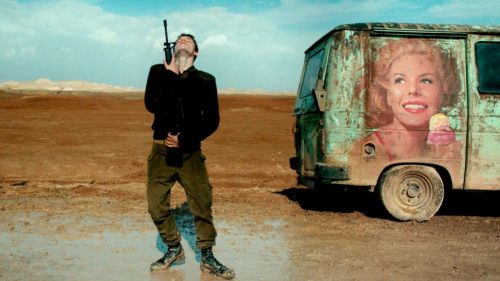Jerusalem Film Festival: The First Dispatch
It was when I was being told about a bombing that I realized Jerusalem is a perfect city to host a film festival.
Across the street from my hotel is the King David Hotel, an opulent spot where world leaders stay when they are in the Holy City, and the site of a terribly deadly 1946 bombing carried out by Irgun, a Jewish insurgency group fighting against the British forces that occupied what was then known as Palestine. At the time the King David Hotel was the central office of the British forces, and members of Irgun - dressed as Arabs! - snuck bombs into the building and exploded them, killing 91 people and wounding 46.
Uri Dromi, Director General of the Jerusalem Press Club and one of my hosts on my trip to the Jerusalem Film Festival, stood in front of the King David Hotel telling this story. “Irgun claimed that they called the British and warned them of the bombing, but that the British chose not to evacuate,” he said. “The British will tell you a different version of the story.”
“In Jerusalem,” Uri said. “Every story has many different versions.”
And Jerusalem is, at its heart, a city of stories. The stories stretch back thousands of years, to the days of King David, to the First and Second Temples, to Jesus of Nazareth and his disciples, to Mohammed and his followers. All of these are the same stories, stories of one true God and His wishes, but they’re all different versions, with everyone giving their own perspective. Somehow all three of these faiths see the same God, but see Him in very different ways.
In Jerusalem the stories are facts, and the facts are stories. Every corner has a tale, every building has a history - true or otherwise. In the center of the Old City is a massive complex, the Church of the Holy Sepulcher, and within it are the spots where Jesus Christ was crucified, where he was buried and where he rose from the dead. For almost two thousand years this area has been kept holy… but nobody marked it until 300 years after the death of Christ. Archeologists and historians agree that Jesus was a man who lived and drew the ire of the Romans and died, but there’s no way to be sure that these sacred spots - spots visited by pilgrims in the thousands - are the true locations. But it doesn’t matter because Jerusalem is a city of stories.
Standing tall over the Old City, the walled city that dates back thousands of years, is the Tower of David. Pilgrims coming in from the west, from the Mediterranean, would have seen this tower beckoning to them in the distance. But it’s not a tower - it’s the parapet of a mosque. And it was built by the Ottoman Empire, so it has absolutely nothing to do with the Biblical King David, who lived thousands of years before the first brick of the tower was laid (and whose city, it turns out, isn’t even at the same location as the current Old City). But it doesn’t matter because Jerusalem is a city of stories.
There is nowhere else on Earth where the power of stories, and the ways we can bring our own perspectives to them, is as clear as in Jerusalem. It is a place where, for thousands of years, people have killed each other over the stories. The stories have been used to justify terror and to excuse oppression, and they have been used to spill the blood of generation upon generation... but they have also brought peace and understanding, and they have allowed people to deal with the harsh reality of the world. At their best that is what stories do. Stories are the way we explain the world to ourselves and the way we share ourselves with the world. They are how we make sense of things, and they are how we can leave behind our own perspective to find out how others experience life.
For me the highest form of storytelling is the cinema, and from July 9th to the 19th the Jerusalem Film Festival is bringing together cinematic stories from around the world, giving many voices and perspectives a moment to share themselves in the Holy City. That a city built on stories should spend time honoring stories only makes sense to me.
I’ve been in Jerusalem for three days now, and the experience has already been extraordinary. I have walked the ancient stone streets of the Old City and walked through the wafting odors of spice shops and falafel stands, through throngs of merchants and waves of Muslims headed to prayer. I’ve sat in the beautiful and modern Jerusalem Cinematheque in air conditioned comfort. I have spoken with journalists from every corner of the world, all come together to watch movies in this most astonishing and humbling of cities. I’ve walked down millennia old alleys while listening to the Beastie Boys. I have seen the wall that divides Israel from the West Bank. I have six more days ahead of me.
Over the course of the rest of the week I’ll be reviewing movies from the Jerusalem Film Festival and I’ll possibly be writing about some of my adventures. I’m trying to catch as many Israeli films as I can - the Israeli film industry is in a boom period and I think good things could come from this country. I’ve seen some promising stuff already, including some Israeli short student films that approach the Arab/Jewish conflict with a remarkable amount of nuance and understanding. When I see IDF forces on the street with machine guns, or when I try to figure out how to get through security checkpoints to travel only a few miles to visit Bethlehem, I realize it was all those old stories that got us into this situation. When I watch these films I believe that they can be one of the things that get us out of it.
Barriers is one of the films I saw; it has done the rounds of film festivals already, so for some of you it could be old news, but I quite like the sticky moral conundrum that sits at the center of it.
In the meantime follow me on Twitter - @devincf - and on Instagram - @baddevin - to keep up with what I'm doing and seeing out here. I've already unleashed a flood of photos, and I have plenty more coming. I don't know that I've ever been in a stranger, more intriguing city in my life.



